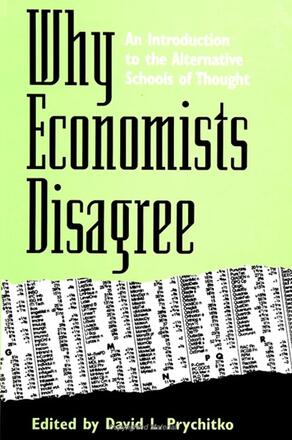
Why Economists Disagree
An Introduction to the Alternative Schools of Thought
Alternative formats available from:
Provides a convenient introduction to heterodox alternatives to neoclassical economics.
Description
Economists disagree. They disagree over policy, prediction, and matters of pure theory. They even disagree over why they disagree. Why Economists Disagree demonstrates that the "crisis" of contemporary economics may actually be a sign of healthy disagreement and fresh thinking over the nature and scope of economic theory and policy.
Since the 1980s, several dissenting schools of thought have emerged that offer serious methodological and theoretical challenges to mainstream economics. Why Economists Disagree provides a convenient introduction to Austrian, Post Keynesian, Institutionalist, Feminist, Marxist, and other heterodox alternatives to neoclassical economics. Written by eminent economists within each tradition, the book's chapters convey both the main characteristics, the controversies, and disagreement within each school of thought.
Contributors include Jack Amariglio, Paul Davidson, William M. Dugger, Alfred S. Eichner, Roger W. Garrison, Albert O. Hirschman, Geoffrey M. Hodgson, Israel M. Kirzner, Arjo Klamer, J. A. Kregel, Ludwig M. Lachmann, Tony Lawson, Deirdre McCloskey, David F. Ruccio, Warren J. Samuels, Howard J. Sherman, William R. Waters, Thomas E. Weisskopf, and Frances R. Woolley.
David L. Prychitko is Associate Professor, Department of Economics, Northern Michigan University. He is the author of Marxism and Workers' Self-Management: The Essential Tension. In addition, he edited Individuals, Institutions, Interpretations: Hermeneutics Applied to Economics; Producer Cooperatives and Labor-Managed Systems Vol. I: Theory and Vol. II: Case Studies (both with Jaroslav Vanek); and The Market Process: Essays in Contemporary Austrian Economics (with Peter J. Boettke).
Reviews
"This book is an argument by counterexample. Following Friedman, Thurow, and others, most economists deny that substantial disagreement exists within the profession. Prychitko shows this simply isn't so. Economists do disagree, and they disagree over theory. By way of proof, the book presents a selection of heterodox articles. " -- Roger Koppl, Fairleigh Dickinson University